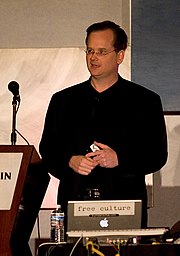Free culture movement
From Wikipedia, the free encyclopedia
| This article needs additional citations for verification. Please help improve this article by adding reliable references (ideally, using inline citations). Unsourced material may be challenged and removed. (September 2007) |
The free culture movement is a social movement that promotes the freedom to distribute and modify creative works, using the Internet as well as other media.
The movement objects to overly restrictive copyright laws, or completely rejects the concepts of copyright and intellectual property, which many members of the movement also argue hinder creativity. They call this system "permission culture".[1]
Contents |
[edit] Organizations
The organization commonly associated with free culture is Creative Commons (CC), founded by Lawrence Lessig. Lessig is a law professor at Stanford University and a prominent figure in the free software movement. He wrote a book called Free Culture, which provides many arguments in favor of the free culture movement.
The student organization Students for Free Culture is sometimes confusingly called "the Free Culture Movement", but that is not its official name. The organization is a subset of the greater movement.
The free culture movement takes the ideals of the free software movement and extends them from the field of software to all cultural and creative works. Early in Creative Commons' life, Richard Stallman (founder of the Free Software Foundation and the free software movement) supported the organization. He withdrew his support due to the introduction of several licenses including a developing nations and the sampling licenses[2] and later restored some support when Creative Commons retired those licenses.
[edit] Defining Freedom
Within the free culture movement, the Creative Commons has been criticized for lacking standard of freedom.[3] Thus, some within the movement only consider a few Creative Commons licenses to actually be free based on the Definition of Free Cultural Works.[4] In February 2008, Creative Commons added an "approved for free cultural works" badge to its licenses which comply -- Attribution and Attribution-ShareAlike. [5] The NonCommercial provision on some Creative Commons licenses remains the most controversial within the free culture movement.
[edit] Criticism
Andrew Keen criticizes some of the Free Culture ideas in his book, Cult of the Amateur, describing Free Culture proponent Lawrence Lessig as an "intellectual property communist".[6]
[edit] See also
| Wikiversity has learning materials about Free culture movement |
- Copyleft
- Free software movement
- Free content
- Cultural environmentalism
- Students for Free Culture
- Open educational resources
- Gratis versus Libre (free as in freedom)
- Open content
- Libre knowledge
[edit] References
- ^ Robert S. Boynton: The Tyranny of Copyright? The New York Times, January 25, 2004
- ^ interview for LinuxP2P (6 february 2006)
- ^ "Towards A Standard Of Freedom". http://mako.cc/writing/toward_a_standard_of_freedom.html.
- ^ "Definition of Free Cultural Works". http://freedomdefined.org/.
- ^ "Approved for Free Cultural Works". http://creativecommons.org/weblog/entry/8051.
- ^ Keen, Andrew (May 16, 2006). Web 2.0; The second generation of the Internet has arrived. It's worse than you think. The Weekly Standard
- Pasquinelli, Matteo. "The Ideology of Free Culture and the Grammar of Sabotage"; now in Animal Spirits: A Bestiary of the Commons, Rotterdam: NAi Publishers, 2008.
[edit] External links
- Resources
- Berry, David M. and Giles Moss. 2006. The Politics of the Libre Commons. First Monday. Volume 11 (September)
- Videoblog: Free Culture, Free Software, Free Infrastructures! Openness and Freedom in every Layer of the Network (Interviews with Kloschi (Freifunk), Kurt Jansson (Wikimedia), Jürgen Neumann (Freifunk), Rishab Aiyer Ghosh (United Nations University), Lawrence Lessig (Creative Commons) and Allison and Benoit (Montréal Wireless))
- Organisations
- Libervis.com is a project of building and promoting a free culture community online.


